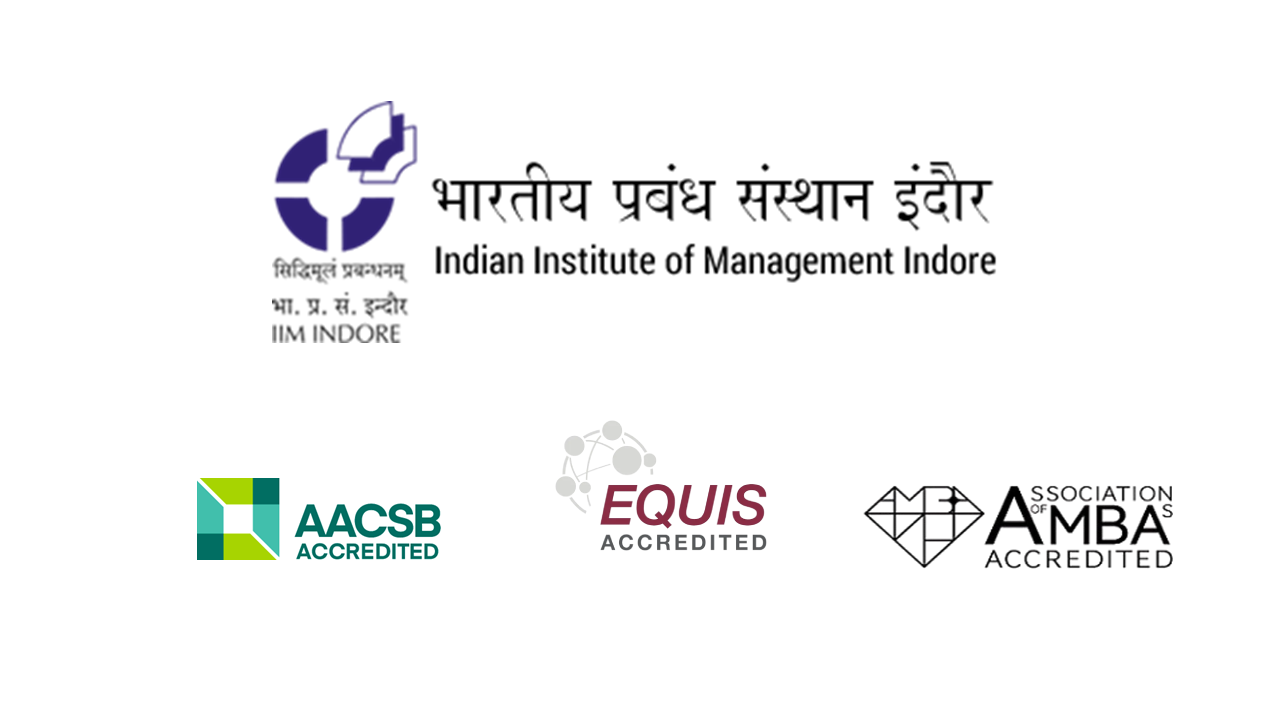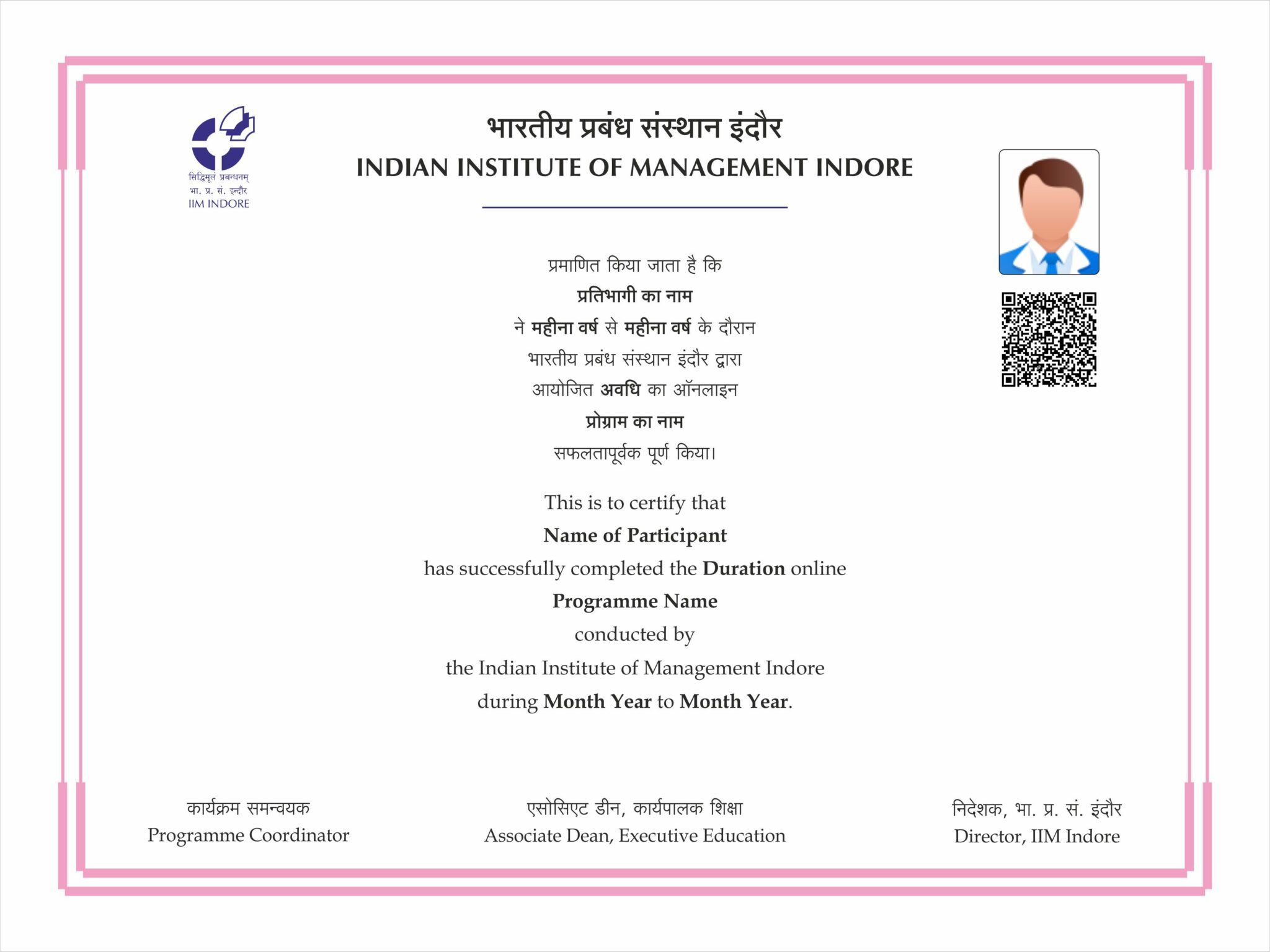
- Batch
03
- Course Duration
10 months
- Commencement Date
19th July 2025
- Application Closure Date
Closed
- Session Timings
Saturday, 1st Session: 5.30 pm to 6.45 pm
- Session Timings
Saturday, 2nd Session: 7.00 pm to 8.15 pm
Admission Criteria

Eligibility & Selection
- Diploma (10+2+3)/Graduate/Post Graduate from Universities recognised by the Association of Indian Universities with minimum 50% marks in either diploma, graduation, or post-graduation (or its equivalent) with at least two years of work experience.
*Internships and Trainee experiences are not considered full-time work experience.
About IIM Indore
IIM Indore is in the forefront of providing carefully curated programmes which cater to the needs of executives. IIM Indore is renowned for its focus on academic excellence which is reinforced by the Triple Crown accreditation that IIM Indore has achieved. Being the second IIM to receive this achievement and being among the top 1% of business schools globally to have the Triple Crown accreditation, our executive education programmes are contextually relevant to meet the demands of contemporary business challenges. The institute has also ranked among the Top 100 business schools globally, as well as among the top institutions in India.

Pedagogical Methodology
Learning Outcomes
Hear from the Facilitator
Admission Process
- 1
Eligibility of Applicant
- 2
Application Submission
- 3
Screening & Shortlisting
- 4
Admission & Fee Payment
- 5
Book your Seat
Unleash the benefits that await you with Jaro Value adds.
%
higher employee retention rate
%
increase in employee productivity
%
higher incomes per employee
%
businesses achieved measurable growth
Companies that already trust us!
Syllabus Breakdown
- Introduction to Artificial Intelligence and Digital Transformation
- Machine Learning and AI
- Big Data and Analytics
- Data Visualization
- Generative AI including Prompt Engineering
- Emerging Technologies like Blockchain and Quantum Computing
- Introduction to Cyber Security: Issues and Challenges
- Introduction to Defensive and Offensive Cyber Security Landscape
- Security in the inter-connected world: Cloud, Mobile, IoT
- Incident Response and Digital Forensics
- Ethical Hacking
- Identity and Access Management (IAM) Concepts, IAM
- Layers and Technology
- Data Privacy, and Data Protection
- Overview of Cyber Crime
- Information Security: Strategy and Policy
- Designing Cyber Security Framework for an Organization
- Overview of Prevailing Cyber Law
Programme Fee Details

- *All the above fee is exclusive of GST.
- *Registration fee is non- refundable.
- *The above fee does not include the Executive Education Alumni fee.
Registration Fee
INR 2500/- + GSTProgramme Fee (Inclusive of Application Fee)
INR 2,00,000/- + GSTInstalment Pattern

- *All the below fee is exclusive of GST
Instalment 1
INR 70,000/- + GST (3 Days from the date of Offer)Instalment 2
INR 70,000/- + GST (15th October 2025)Instalment 3
INR 57,500/- + GST (15th January 2025)Know the Facilitator
Programme Certification
Participants who successfully meet the evaluation criteria will receive the prestigious ‘Certificate of Completion’ from IIM Indore.
Note: The sample certificate is indicative. The Institute reserves the right to revise it.

Unlock Your Path to Success
Unsure about which course to choose? We understand—selecting the right programme can feel overwhelming. That’s why our intuitive Course Finder is here to help you discover the perfect match based on your skills, goals, and interests. Let us guide you toward your next career milestone with confidence.
Find My Ideal Course Find My Ideal Course

Refer & Earn – Amazing Rewards Await!
Share the gift of education—refer your friends and colleagues now! Earn fantastic rewards for every successful referral and empower others to advance their careers while you benefit.
Start Referring Today! Start Referring Today!Frequently Asked Questions
The pedagogy has been meticulously curated with a judicious blend of lectures, case studies, project work, term papers, and assignments, among other things.
- This multi-disciplinary course is designed to equip non-engineers/non-tech graduates, managers, Engineers, and Cybersecurity Career aspirants: Early-career IT professionals, IT project managers and engineers wanting to gain the ability to think critically about the threat landscape, including vulnerabilities in cyber security for career advancement.
- Managers who lead technology functions.
- Participants are expected to attend all sessions of a given course. However, Participants may take leave on account of emergencies, subject to the approval of the Programme Coordinator. However, a 75% minimum attendance requirement would be considered for the final grading. For less than 75% attendance, a grade cut as per the norms will be applied.
Participants will be introduced to:
-
AI/ML tools: Python, Scikit-Learn, Jupyter Notebooks
-
Data tools: Tableau, Power BI, Hadoop
-
Cybersecurity tools: Wireshark, Metasploit, Nmap
-
Generative AI platforms: ChatGPT, GitHub Copilot




